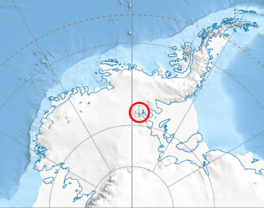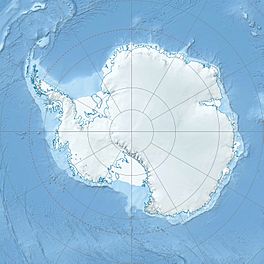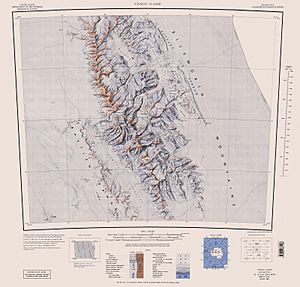Hough Glacier facts for kids
Quick facts for kids Hough Glacier |
|
|---|---|

Location of Vinson Massif in Western Antarctica
|
|
| Location | Ellsworth Land |
| Coordinates | 78°32′S 84°20′W / 78.533°S 84.333°W |
| Length | 10 nautical miles (19 km; 12 mi) |
| Thickness | unknown |
| Status | unknown |
Hough Glacier (78°32′S 84°20′W / 78.533°S 84.333°W) is a large river of ice found in the very cold continent of Antarctica. It is located in the central part of the Doyran Heights. This area is part of the Sentinel Range, which belongs to the bigger Ellsworth Mountains.
Hough Glacier stretches for about 10 nautical miles (which is about 18.5 kilometers). It flows towards the east-southeast. You can find it nestled between two other glaciers, called Guerrero Glacier and Remington Glacier.
What is a Glacier?
A glacier is like a very slow-moving river made of ice. It forms over many years as snow piles up and gets pressed into thick ice. Glaciers are important because they store a lot of the world's fresh water. They also help shape the land as they move.
Location in Antarctica
Hough Glacier is in Ellsworth Land, a part of West Antarctica. Antarctica is the coldest continent on Earth. It is almost completely covered by a thick ice sheet. This ice sheet holds about 90% of the world's ice. It also holds about 70% of the world's fresh water.
The Sentinel Range, where Hough Glacier is, is the highest mountain range in Antarctica. It includes Vinson Massif, which is the continent's highest peak.
Discovery and Naming
Hough Glacier was first mapped by the United States Geological Survey. This group makes maps of the land. They used surveys and air photos taken by the United States Navy between 1957 and 1959.
The glacier was named by the Advisory Committee on Antarctic Names. This committee decides the names for places in Antarctica. They named it after William S. Hough. He was a scientist who worked at the South Pole Station in 1957.
Who was William S. Hough?
William S. Hough was a scientist who studied the ionosphere. The ionosphere is a part of Earth's upper atmosphere. It is full of charged particles. Studying the ionosphere helps us understand how radio waves travel around the world. This research is important for communications.
 | Lonnie Johnson |
 | Granville Woods |
 | Lewis Howard Latimer |
 | James West |



